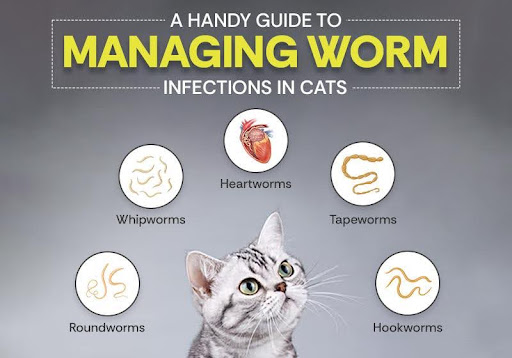Worms in cats are not something unheard of. But it can still be disturbing for you to discover your furball has worm infections. These internal parasites can compromise your feline friend’s overall health and rob them of a healthy life. Therefore, it is of utmost importance you recognize your furry companion’s worm infestations and treat them right away. Even better, you can prevent the occurrence of worm infections in the first place to save your pet from the trouble. And how do you do that? Let us help you.
Read on to learn about the types of worms that can infect your cat, common symptoms of worm infestations, and how to treat and prevent them with the right dewormer for cats.
Types of Worms in Cats
Worms are internal parasites that affect cats of all ages (kittens, adults, & seniors), sizes and lifestyles (indoor & outdoor). The most common ones are intestinal worms that infest a cat’s gastrointestinal tract. The common worms in cats include:
- Roundworms
Nearly all cats get roundworm infestation at least once in their lifetime. These worms have a spaghetti noodle like structure and are visible to the naked eye. Kittens can get these worms from their mother while nursing. These worms steal nutrients from the food your cat eats. They grow and lay eggs inside your fur friend and get eliminated through the feces or vomit. These worms are not very dangerous for adult cats but can result in death in kittens if left untreated. - Whipworms
Whipworms have a whip-like body with one thicker end and one thinner end. Your cat can catch these worms if they ingest contaminated food, water, soil or infected feces. Whipworm infections are not very common, but they can be of serious concern as these worms can live in the environment for up to 5 years and can survive in the host for up to 16 months. - Tapeworms
With a flat and ribbon-like structure, tapeworms grow inside the intestine of cats. Cats catch tapeworm infection when they accidentally ingest fleas that carry tapeworm eggs while grooming. Segments of tapeworms resembling small rice grains or sesame seeds get visible in cats’ poop. You can also find tapeworms on the cat’s fur near the anus. - Hookworms
Hookworms are not visible to the naked eye and thus difficult to detect. These worms have hook-like teeth they use to attach to the lining of the cat’s intestine. Once attached, they feed on your pet’s blood. Cats can directly ingest these worms or can get them from their mother from birth. Hookworms are harmful parasites as they can cause intestinal bleeding. - Heartworms
Cats get heartworms when they get a bite from an infected mosquito carrying the heartworm larvae. Heartworms infest your cat’s heart, blood vessels and lungs. It is a potentially deadly infection, as there is no treatment available for heartworm disease in cats.
Symptoms of Worm Infections in Cats
Though the symptoms of worm infestations depend on the type of worm that has infested your pet, here are some of the common signs that indicate worm infections in cats:
- Change in coat appearance (dull coat or loss of fur)
- Frequent vomiting
- Pale or white gums (due to worm-induced anemia)
- Weight loss
- Increased appetite
- Coughing or troubled breathing (due to lungworms)
- Pot-bellied abdomen
- Diarrhea/ change in stool color (dark, tarry stool)
- Presence of worms in stool, vomit or on the fur near the anus
Treatment & Prevention of Worms in Cats
The first action once you discover that your fur friend has worm infestations should be to eliminate them at the earliest. Take your furry companion to a veterinarian so that they can diagnose the type of worms your cat has contracted and accordingly suggest the treatment.
Select the product that protects against the type of worm infection your cat is affected with. You can select a topical or oral treatment as per your furball’s preference. Some of the effective deworming treatments for cats include:
- Panacur Granules for Cats: An oral treatment for gastrointestinal worms such as hookworms, tapeworms, roundworms & whipworms.
- Profender for Cats: A topical solution for the treatment and control of hookworms, roundworms and tapeworms in cats.
- Milbemax for Cats: This tablet prevents heartworm disease in cats, along with protecting against roundworms, hookworms, and tapeworms.
There is no approved heartworm disease treatment available for cats. If a cat tests positive for adult heartworms, seek the help of a veterinarian for surgical removal of heartworms and to provide supportive care by treating the symptoms. Administer heartworm preventives to keep your pet protected from heartworm disease. Advantage Multi for Cats, Revolution Plus, Bravecto Plus, etc., are a few effective treatments to help prevent the disease.
However, the best way to ensure your furry friend’s year-round protection will be to deworm them regularly, i.e., at least once every three months. Also, treat all pets in the house in case you have multiple pets. Clean the bedding, carpets and the areas that your cat visits frequently after the treatment so that they do not get re-infestation by ingesting worm eggs present in the environment.
Concluding Note
All cats, indoors or outdoors, kittens or seniors, can catch infections from various types of worms. Though treatable, these worms can compromise your fur friend’s health in many ways. It is best, therefore, to recognize the type of worms your cat is infected with and treat them promptly. Additionally, deworm your cat regularly and take preventive measures to keep these nasty creatures away from them.


